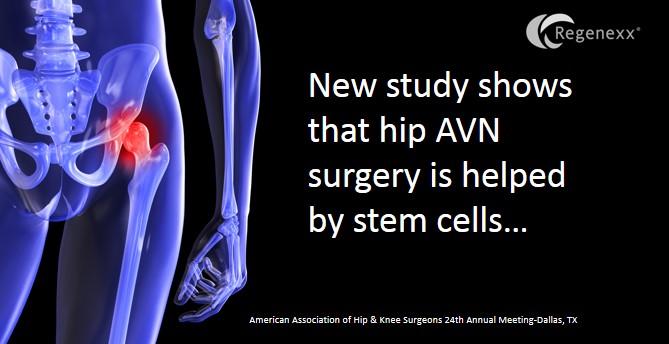Stem Cell Treatment for Hip AVN: New Research
We’ve been performing stem cell treatment for hip AVN since approximately 2006 and have seen some good results in the right patients. Unlike many other things we treat, we weren’t the first to tackle this issue with stem cells, that honor going to European researchers in the 90s. Now a new randomized controlled trial shows that adding stem cells to the common surgery for hip AVN may help outcomes.
Hip AVN is a horrible disease, in that patient’s often find out very suddenly and at an early age that their new onset hip pain is really due to their bone dying. The bone perishes quickly and in a number of months to about a year often collapses, leaving the normally round peg of a femoral head to become a square peg in a round hole. Traditional surgical treatment is called a CORE decompression. This is when the surgeon drills a sizable tunnel into the bad bone in hopes of “decompressing the area”. What is there to decompress? It was thought based on early research that the area was high pressure and/or that the dying bone was caused by poor blood supply. However, more recent research has shown that the bone problem is likely caused by the local stem cells that maintain the bone not functioning properly, leaving it vulnerable.
The concept that stem cells could help the bone without any surgery started back in the late 90s with Phillipe Herigou, a European cell therapy pioneer. What was exciting about Hernigou’s work was that in early stage patients (known as ARCO grade 1s and 2s), high success rates were reported in helping patients avoid an almost certain hip replacement. Hernigou placed the cells via what was basically a large needle rather than a traditional surgery, which reduced the likelihood that the effect had much to do with the traditional surgery (which had lesser success rates by itself).
Teaching surgeons how to place large needles into the bone under x-ray guidance has proved difficult, so more commonly, surgeons that use stem cell therapy for hip AVN by adding stem cells on top of the common CORE decompression technique. The new study (reported at the American Association of Hip & Knee Surgeons 24th Annual Meeting in Dallas, TX) looked at this procedure with and without stem cells by randomizing 28 patients into either group. After following the patients for two years, the pain and function was better in the stem cell group than the surgery alone patients.
The upshot? We’ve known for some time that placing stem cells into the hip AVN area through a needle, which is much less invasive than surgery and ha a quicker recovery time, works well in the right patients. We’ve likely performed more cases using this method than anyone else in the U.S. However, getting surgeons to ditch surgery is an uphill battle, so this small controlled trial is likely a big step in convincing surgeons that stem cells can help AVN patients.

If you have questions or comments about this blog post, please email us at [email protected]
NOTE: This blog post provides general information to help the reader better understand regenerative medicine, musculoskeletal health, and related subjects. All content provided in this blog, website, or any linked materials, including text, graphics, images, patient profiles, outcomes, and information, are not intended and should not be considered or used as a substitute for medical advice, diagnosis, or treatment. Please always consult with a professional and certified healthcare provider to discuss if a treatment is right for you.
